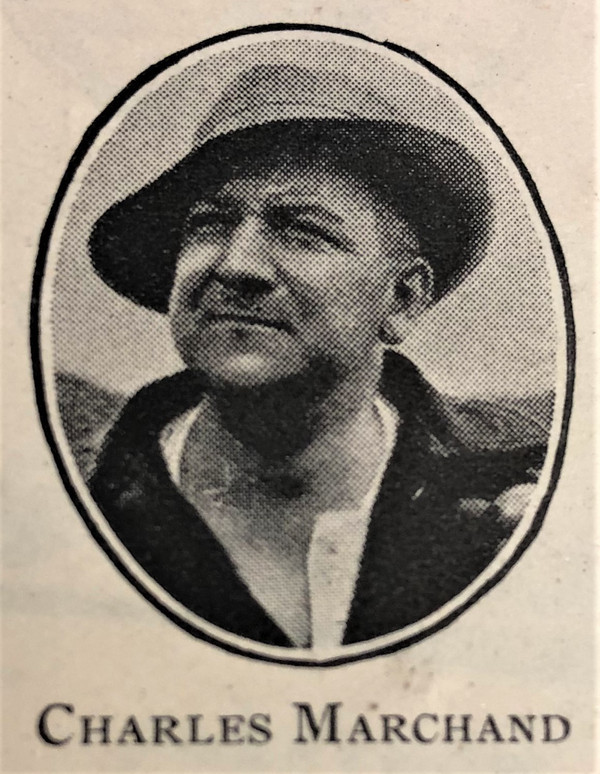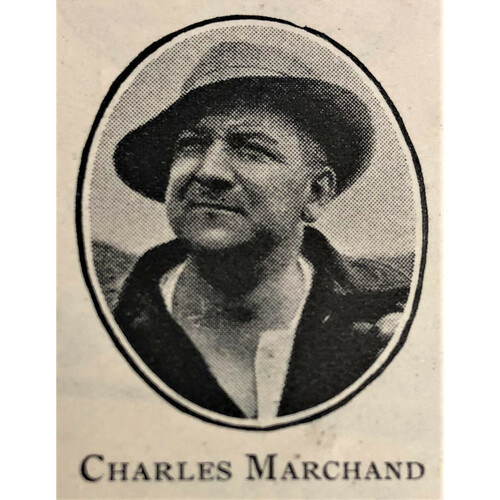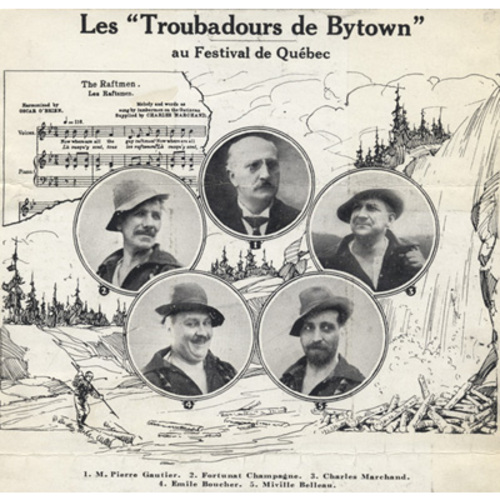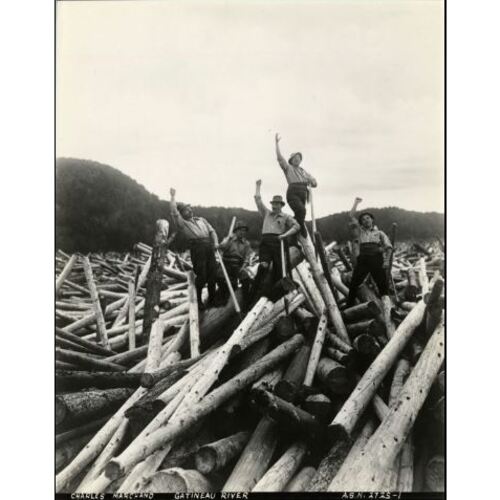
Source: Link
MARCHAND, CHARLES (baptized Joseph-Charles-Édouard), office holder, baritone, folklorist, journalist, and artistic director; b. 8 May 1890 in Saint-Paul-l’Ermite (Le Gardeur), Que., son of Sévère-Gaspard Marchand, a mechanic, and Zoé Quintal; m. 19 Oct. 1912 Marie-Anita Reinhardt in Hull, Que.; three sons and one daughter survived him; d. 1 May 1930 in Montreal.
Charles Marchand attended the Collège de L’Assomption from 1902 to 1906, and then completed his classical studies at the Collège Bourget in Rigaud. In 1910 he moved to Hull and found employment with the federal Department of the Interior. It was through this position (which he would leave around 1918 to devote himself to singing and to folklore) that he met Fortunat Champagne, who would become a colleague.
Marchand made his first public appearance in Ottawa in 1910, as a member of the cast of the play Fleur d’ajonc by Théodore Botrel, who was a popular entertainer in French Canada at that time. Next he used his baritone voice for the benefit of parish charities, performing without pay at various events. His repertoire showed some similarity to that of Botrel, who highlighted rustic and Catholic Breton songs, but it gradually came to reflect the concrete realities of French Canadian life. In 1915 he began working with Oscar O’Brien*, who would arrange some 150 pieces for him, and with Maurice Morisset, who would write some of his songs. Marchand made his professional debut in Montreal on 12 March 1919 at the Salle Lafontaine.
Marchard gave his first important performance in May of the following year, when he was accompanied by harmonica players and fiddlers in traditional costume. The event took place at the Monument National in Montreal, the city to which he had recently moved; he is said to have studied singing there, with Jean Riddez and Max Pantaleieff. Alexandre D’Aragon, in an article on Marchand in the Saint-Jérôme paper L’Action musicale, littéraire et artistique on 14 May 1932, would emphasize his fine “timbre” and his “warmth in communicating.” These gifts, along with the raftsman’s costume and ceinture fléchée he wore when he performed his rousing songs, would make Marchand an emblem of the French Canada of his day.
Marchand, O’Brien, and Morisset, along with pianist Ernest Patience, founded a musical movement named the Carillon Canadien on 31 Jan. 1922. From 1922 to 1925 Marchand toured Quebec and visited parts of Ontario and a few towns in western Canada and in New England. He became editor of Le Carillon, which was published in Montreal from May 1926 to March 1927, when it merged with La Lyre. The periodical described itself as a theatrical, musical, and literary magazine seeking to promote “la bonne chanson.” The publishing house Le Carillon brought out the songs by Morisset and O’Brien that Marchand performed.
For the celebrations held in Ottawa in 1927 to mark the 60th anniversary of confederation, Marchand put together a quartet. The Bytown Troubadours – Marchand, Émile Boucher, Miville Belleau, and Fortunat Champagne – went on tour in Canada as well as in the United States, and their repertoire included songs translated into English by John Murray Gibbon. In 1927, 1928, and 1930 the quartet was on the program of the Canadian Folk Song and Handicraft Festival, which was held in those years mainly in the Château Frontenac at Quebec. This series of festivals was organized by Gibbon, who was the publicity director in Canada for the Canadian Pacific Railway; the company sponsored the event, which took place at various CPR hotels from 1927 to 1931. Marchand took over part of the artistic direction of the festival in 1928. He was also involved in organizing the event in 1930, but it was postponed because of his sudden and premature death.
Charles Marchand helped gain recognition for the oral tradition by performing the repertoire that Marius Barbeau* had assembled; Marchand contributed to Barbeau’s efforts. Besides Morisset and O’Brien, his colleagues included songwriters Pierre Dupaigne, Lucien Sirois, Hector Nadeau, and Robert Choquette*, as well as musician Hector Latour. From 1922 to 1926 he made many solo recordings for Edison and Columbia in New York and the Starr studios in Montreal. Marchand helped bring French Canadian songs into the cause of “la bonne chanson,” which until then had consisted mainly of Botrel’s work.
AC, Hull, État civil, Catholiques, Notre-Dame-de-Grâce (Hull), 19 oct. 1912. ANQ-M, CE605-S33, 8 mai 1890. Le Devoir, 2 mai 1930. Dictionnaire biographique des musiciens canadiens (2e éd., Lachine, Qué., 1935). Encyclopedia of music in Canada (Kallmann et al.). Gabriel Labbé, Les pionniers du disque folklorique québécois, 1920–1950 (Montréal, 1977). Bruno Roy, Panorama de la chanson au Québec ([Montréal], 1977). Soc. Hist. de Montréal et Soc. de Folklore d’Amérique (section de Québec), Veillées du bon vieux temps à la Bibliothèque Saint-Sulpice, à Montréal, les 18 mars et 24 avril 1919 (Montréal, [1920]).
Cite This Article
Jean-Nicolas De Surmont, “MARCHAND, CHARLES (baptized Joseph-Charles-Édouard),” in Dictionary of Canadian Biography, vol. 15, University of Toronto/Université Laval, 2003–, accessed March 2, 2026, https://www.biographi.ca/en/bio/marchand_charles_15E.html.
The citation above shows the format for footnotes and endnotes according to the Chicago manual of style (16th edition). Information to be used in other citation formats:
| Permalink: | https://www.biographi.ca/en/bio/marchand_charles_15E.html |
| Author of Article: | Jean-Nicolas De Surmont |
| Title of Article: | MARCHAND, CHARLES (baptized Joseph-Charles-Édouard) |
| Publication Name: | Dictionary of Canadian Biography, vol. 15 |
| Publisher: | University of Toronto/Université Laval |
| Year of publication: | 2005 |
| Year of revision: | 2005 |
| Access Date: | March 2, 2026 |





